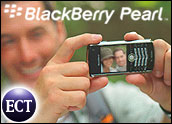
Facebook members can now access the social networking site on the go — as long as they have a BlackBerry smartphone. Facebook Cofounder Dustin Moskovitz and Research In Motion President and Founder Mike Lazaridis demonstrated the new service Wednesday during the CTIA Wireless IT & Entertainment Show in San Francisco.
“Facebook is one of the fastest growing Web destinations among BlackBerry smartphone users, and it has become an important element in the evolving fabric of personal communications,” Lazaridis said.
“Facebook and RIM share a vision for enhanced mobile communications and social networking based on open, standards-based platforms, and this has allowed us to produce a rich mobile application for Facebook users that leverages the push-based architecture, multimedia features and industry-leading usability of the BlackBerry solution,” he added.
T-Mobile will be the first carrier to sell BlackBerry devices with the Facebook application pre-loaded, though the software can be downloaded onto RIM smartphones using other carriers.
Little Black Book
The application, Facebook for BlackBerry Smartphones (FBS), enables Facebook users to wirelessly compose and send messages; receive messages automatically; view messages, photos, pokes and Wall posts. Unlike browser-based access, the rich, native mobile version of the social networking site automatically pushes notifications to the users’ BlackBerry smartphones as they receive notes Wall post and pokes from friends and colleagues.
With FBS, BlackBerry users can pursue the same activities on the move as they would online with convenient onscreen icons including the ability to take a photo and upload it to Facebook with both captions and tags; easily invite friends, manage events, manage photo albums and manage their status.
FSB is available as a free download. Facebook members may download the application from the site with their PC or by using their BlackBerry device.
The application is nicely integrated into the BlackBerry platform, said Bill Hughes, principal analyst at Instat, who demoed FSB at the CTIA Wireless IT & Entertainment Show.
“It is definitely more consumer-oriented and not very business-oriented at all,” he told TechNewsWorld.
For businesses and colleagues thinking of staying in touch by using Facebook, Hughes said he thinks simple e-mail would be a better tool.
“This is social and it can build rapport, but its core is social,” he continued.
Six Degrees of Separation
The tie-up between RIM and Facebook would not have been possible a few years ago when the bulk of the site’s users were college-aged or younger. However, users 25 years old and older are the fastest growing demographic among the site’s more than 49 million users, according to Facebook’s statistics.
“BlackBerry wouldn’t have had any motivation to do the deal [if Facebook hadn’t opened up to businesses and professionals],” said Greg Sterling, principal analyst at Sterling Market Intelligence.
The partnership is more of a win for BlackBerry than Facebook — its demographic doesn’t include heavy BlackBerry users, Sterling told TechNewsWorld. “But it may open up the business user to Facebook as a result. LinkedIn would be a better fit, but LinkedIn isn’t as hot. This has more buzz/PR value for RIM.”
Sterling sees no real risk in the deal for either Facebook or BlackBerry.
“Only some embarrassment if they make a big deal out of it and nobody winds up using it,” he added. “But there’s very little downside.”
However, RIM’s attempt to be more consumer-like, according to InStat’s Bill Hughes, is “too consumer-like” at a time when the smartphone maker should be doing what it can to consolidate its base.
“If you’re going to do something like that, LinkedIn is closer to [RIM’s] historical target,” he said. “But they are trying to show that they are more hip and modern.
“Research In Motion needs to shore up its base — which is the enterprise — and not spend as many resources going after prosumers and consumers,” he added.
Facebook is now 1.6 percent owned by Microsoft after Redmond’s $240 million buy-in this week — a purchase that values the social networking site at $15 billion. Microsoft is well positioned in enterprise, and the software giant’s announcement on Tuesday at CTIA that it is offering better management tools is the beginning of a stronger effort on its part to get into a market where RIM has enjoyed an uncontested rule, Hughes stated.
“This announcement says to me that now [Microsoft] is beginning to execute towards truly serving the enterprise market where RIM has had its strength. It is a very stark demonstration that RIM needs to focus on the enterprise.”



















































